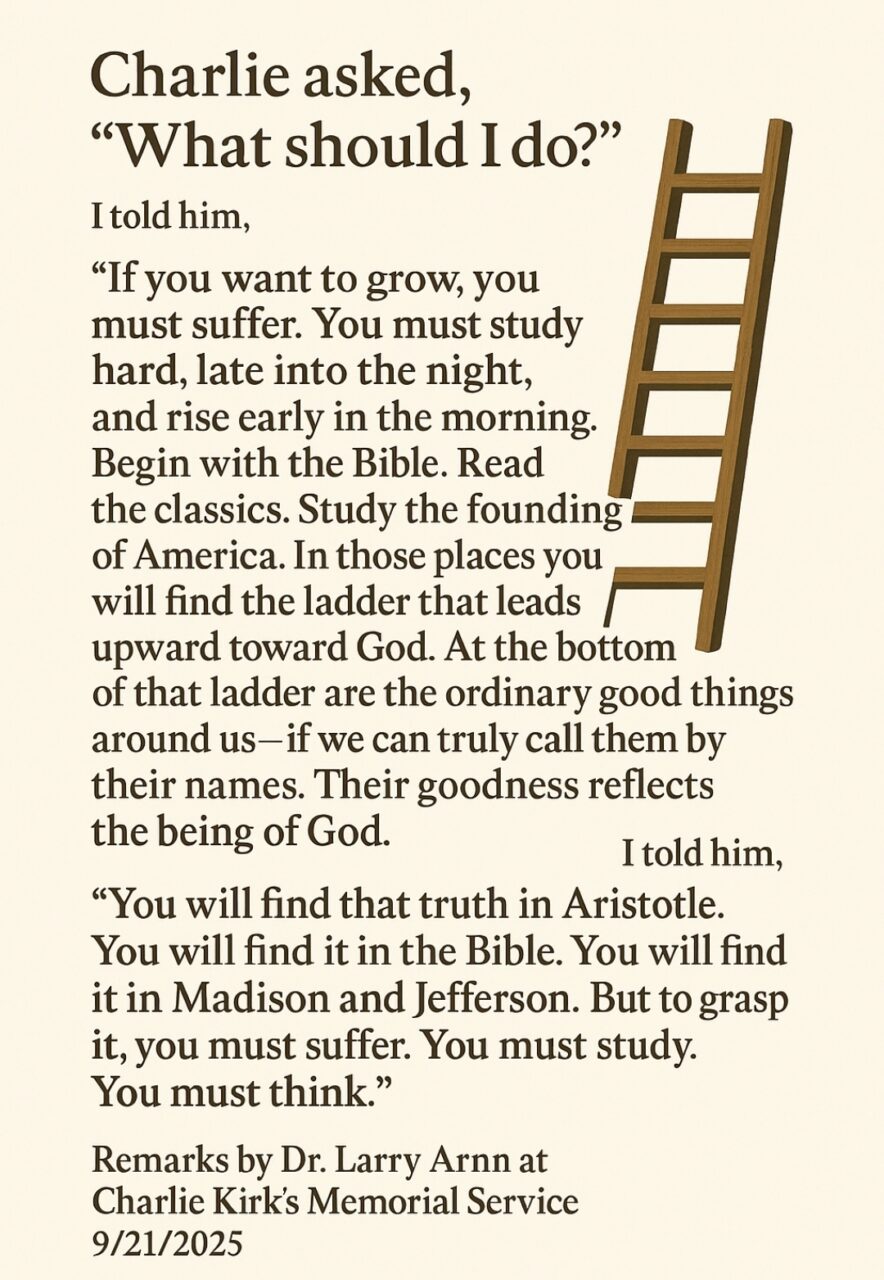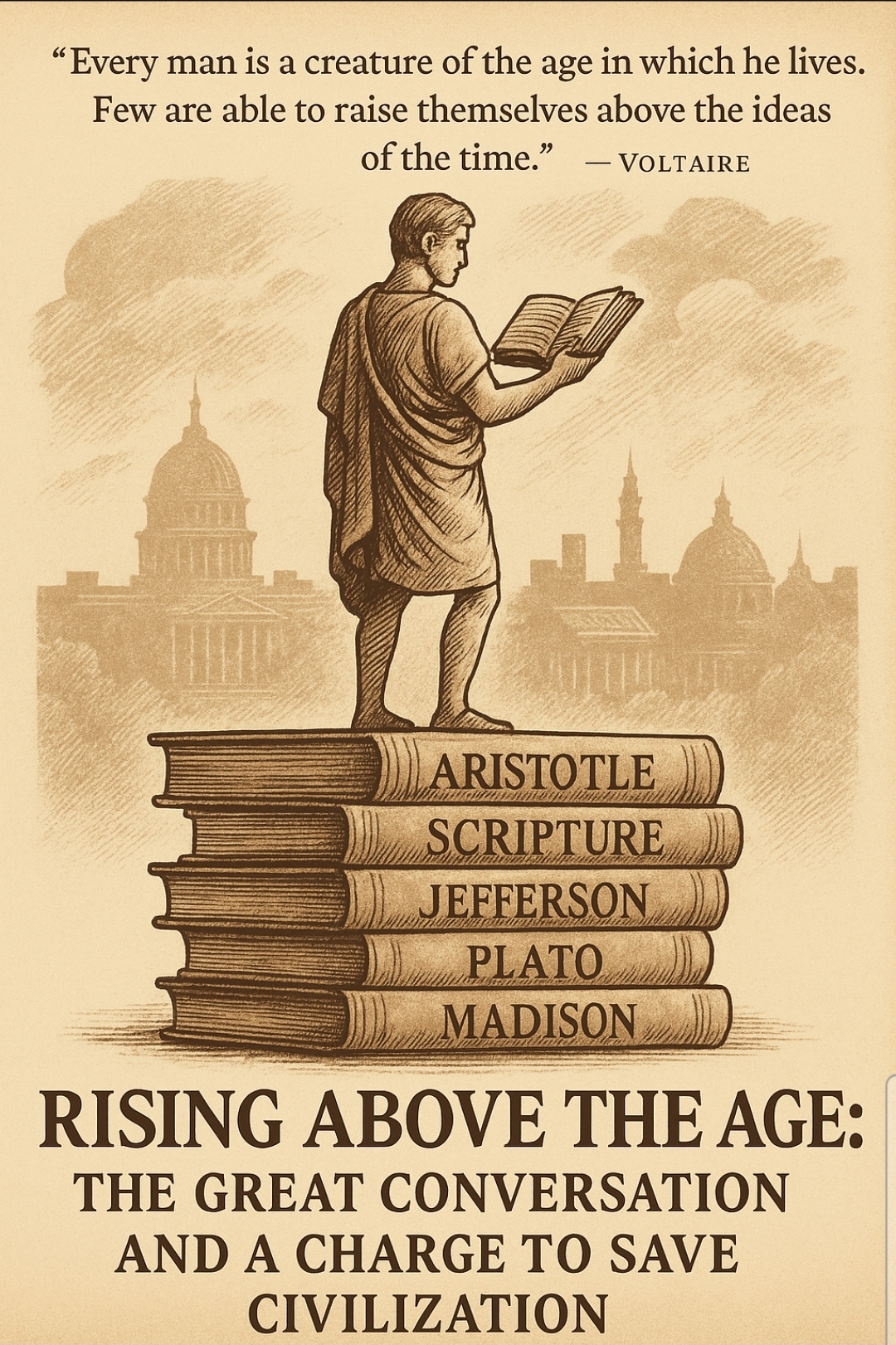Charlie Kirk’s memorial was filled with grief, gratitude, and—unexpectedly—homework. Not the busywork kind, but a lifelong assignment: suffer, study, think. It came from Dr. Larry Arnn’s simple answer to a nineteen-year-old Charlie who once asked, “What should I do?” The answer was a map back to first principles—Scripture, the classics, the American Founding—and a ladder that “leads upward toward God.”
That moment, repeated at the memorial, is the key to understanding Charlie’s life and the mission he left behind. It also frames a larger question for our anxious era: Will we be creatures of our time, or will we rise above it?
“Check Your Ego at the Door”
Turning Point USA stitched together soundbites from Charlie that capture his posture toward work, country, and calling:
- “You’re about to embark on something much bigger than yourself. Check your ego at the door. This is not about you—it’s about us, about the country.”
- “We don’t do mediocre. We set the standard of excellence.”
- “This isn’t just another D.C. gig. This is about saving Western civilization.”
- “Early mornings, late nights—but lives are changed.”
Love him or not, the through-line is clear: urgency with direction, intensity tied to service, discipline without the performative bitterness that often substitutes for seriousness. The point wasn’t merely to “win news cycles,” but to train people at scale—events, chapters, media—and send them back into institutions that had drifted from their foundations.
The Hillsdale Conversation: Suffer, Study, Think
Dr. Arnn told a story. He challenged a young, already-famous Charlie with questions he couldn’t answer. Rather than bluff, Charlie asked what to do next. Arnn’s reply:
“If you want to grow, you must suffer. Study hard, late into the night, and rise early in the morning. Begin with the Bible. Read the classics. Study the Founding. In those places you will find the ladder that leads upward toward God. At the bottom of that ladder are the ordinary good things around us—if we can truly call them by their names. Their goodness reflects the being of God.”
Arnn expected silence. Instead, within a month Charlie texted a certificate from a Hillsdale online course—the first of thirty-one he would complete. Arnn keeps a short internal list of the finest young people he’s ever known; Charlie, he said, sits at the top.
Two ideas are embedded in that advice:
- Education as formation—not just information. Begin with sources that tell the truth about man, law, and God.
- Reality has a moral structure. “A good thing is something that truly has being,” Arnn said. To destroy what is good, the assassin must first abandon his own humanity.
At the memorial, Arnn announced an honorary degree for Charlie and a scholarship for his children. But the honor that matters most in this story is the habit Charlie built: a lifetime of returning to texts that outlast moods and news.

Voltaire’s Warning—and Why It Fits Here
“Every man is a creature of the age in which he lives. Few are able to raise themselves above the ideas of the time.”
That line (often paraphrased) landed with force because it rings true in 2025. Most people reflect the water they swim in—media feeds, partisan reflexes, professional incentives. But a minority can climb out, survey the current, and refuse to be dragged where it runs fastest.
Applied today, the warning is practical:
- Media & propaganda: Slow down. Ask whether a claim is true or merely popular. Resist outrage on demand.
- Politics & culture wars: Test your principles against your own tribe. Would you defend this standard if your side violated it?
- Morality & faith: Every era has blind spots. Ours baptized consumerism, comfort addiction, digital dependency, and institutional cynicism. Use conscience, Scripture, and natural law—not fashion—as your plumb line.
- Personal life: Social media rewards conformity—rage, irony, curated perfection. Live by truths that will still matter in ten years.
Voltaire’s point is not cynicism. It’s a summons to courage: rise above the illusions of your age. Charlie’s answer—enter the Great Conversation—is how.
Why the “Great Conversation” Still Works
The Bible, Aristotle, Madison, Jefferson—these are not museum pieces. They are durable tools for seeing clearly. They teach:
- Human nature is constant. The same ambitions and frailties that plagued Athens and Philadelphia also haunt modern bureaucracies and movements.
- Rights come from God, not the state. That belief anchors human dignity and restrains power. Lose it and power becomes the source of “rights.”
- Liberty requires virtue. Freedom without self-government collapses into license, then invites coercion to clean up the mess.
- The rule of law beats the rule of men. Institutions must be designed to check ambition with ambition, because character alone isn’t enough.
When Charlie pushed his team—“We do excellent things. Big things. Historic things.”—he wasn’t just hyping an event. He was pointing to a set of standards rooted in this inheritance: work hard, tell the truth, take responsibility, love your country enough to correct it.
Courage With Direction
Dr. Ben Carson, speaking at the service, reminded listeners that most learning happens outside classrooms—and that the American genius was to bind liberty to moral truth. He challenged pastors to preach what the Bible says, not what trends demand, and he quoted John 12:24: “Except a corn of wheat fall into the ground and die, it abideth alone; but if it die, it bringeth forth much fruit.” The implication was pointed: sacrificial leadership yields life beyond itself.
This is the antidote to despair. Today’s problems are real—debt, distrust, division, institutional rot—but they are not new. The cure is also old: tether courage to truth, rebuild from the foundations, cultivate citizens who can govern themselves.
A Practical Rule of Life (Charlie-Style)
If you want to honor the legacy without the idolatry, start small and stay stubborn:
- Daily first principles: Read Scripture before headlines. Add 10 pages of a classic each day.
- The ladder habit: One hard thing early (study, prayer, exercise). Stack wins.
- Local over viral: Join or build something you can touch—school board, campus chapter, neighborhood effort.
- Principle checks: When your side is wrong, say so—publicly if needed. Prudence isn’t cowardice; silence often is.
- Excellence as a witness: Do your craft so well that critics must admit the standard you uphold.
- Mentor someone younger: The Great Conversation is a relay; pass the baton.
The Work Ahead
Charlie kept telling his people: “This is about saving Western civilization.” Grand words, easy to parody. But the mechanics are humble: open a book, open your home, open your mouth, and open your calendar to work that outlasts you.
Most of us will be “creatures of our age.” A few will rise above. The path is not complicated. It is just costly.
Suffer. Study. Think.
Then build—so that when another nineteen-year-old asks, “What should I do?” you’ll have more than a speech. You’ll have a life worth imitating.







